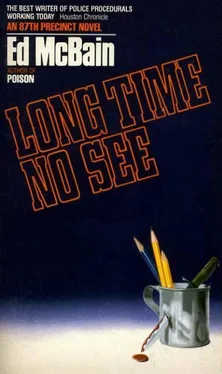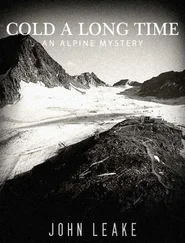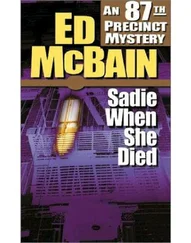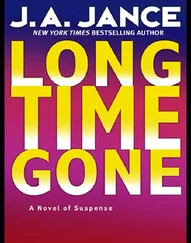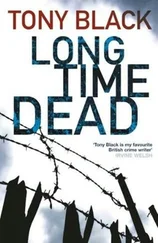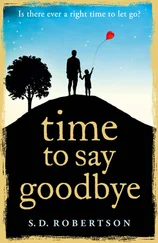Tauber looked down at the dead woman. There was blood all over the landing, blood on the keys of the accordion — shit, was there ever a Saturday night that went by in this city without a fuckin homicide?
“Where’s the man called it in?” Tauber asked the patrolman at his elbow.
“Down the hall there,” the patrolman said. “Guy in the gray sweater there.”
“What’s his name?”
“I don’t know.”
“Okay, thanks,” Tauber said. “Don’t touch nothin, you hear?”
“Why would I touch anything?” the patrolman asked.
“That’s exactly what I’m sayin,” Tauber said, and walked toward the other end of the landing, where a man stood just outside the door to apartment 1 A.
The man appeared to be in his late fifties, thin and balding, with gray hair spraying out from behind each ear and combed sideways across his flaking pate. He was wearing rumpled black trousers and a gray sweater over an undershirt. The sweater had bum holes in it; Tauber automatically concluded that the man was a pipe smoker. Either that, or he had tried repeatedly to set fire to himself. Black-rimmed spectacles were perched on the man’s nose. Behind the glasses, his brown eyes darted nervously. As Tauber approached, the man scratched his chin. He needed a shave. Tauber figured he hadn’t been out tonight. Saturday night, and he’d been home. He made a mental note.
“You the man found the body?” he asked.
“Yes, sir, I am.”
“What’s your name?”
“Gerald Epstein.”
“Who is she, do you know her?” Tauber asked, gesturing with his head toward the body at the other end of the hall.
“She’s a very good friend of mine. Her name is Hester Mathieson, she lives upstairs on the second floor.”
“How’d you come across the body?”
“What do you mean?”
“How’d you happen to be out here in the hall? Were you coming home from someplace?”
“No, I was going downstairs for some milk. I ran out of milk.”
“What time was this?”
“About a quarter to eight.”
“How’d you happen to see her there at the other end of the hall?”
“I just saw her, that’s all.”
“Went over to her, did you?”
“Yes.”
“Recognize her right away?”
“Yes.”
“What’d you do then?”
“I went back to my apartment and called the police.”
“What time was that?”
“A few minutes later. Right after I found her.”
“Hear anything out here before then?”
“No.”
“Nothing at all, huh? No screams, no sounds of a struggle, nothing like that.”
“Nothing. I had the television on.”
“You were home all night, huh?”
“Yes.”
“Didn’t hear anything, though.”
“No.”
“What’d you say her name was?”
“Hester Mathieson.”
“Spell the last name for me, would you?”
“M-a-t-h-i-e-s-o-n.”
“How old is she, would you know?”
“Sixty-three.”
“Got any relatives that you know of?”
“She had a niece who used to come around, but she moved to Chicago.”
“When was that?”
“About six months ago.”
“What’s her name?”
“Stephanie Welles.”
“Would you know where she lives in Chicago?”
“On Warrington Avenue someplace. I’m not sure of the address. Whenever Hester got a letter from her, she’d ask me to read it out loud.”
“Didn’t she know how to read?”
“What do you mean?”
“Hester. The dead woman.”
“She was blind,” Epstein said. “Didn’t you know that?”
“Blind?”
“Didn’t you see the white cane?”
“No,” Tauber said, “I didn’t notice it. Blind, huh?”
Carella had just finished dinner when the telephone rang. He was sitting in the living room, looking at the mantel clock and planning to take his wife to bed. It was only nine p.m., the twins were already asleep, Fanny was watching television in the spare room, and the condition inspired by Janet up there at Fort Mercer had metamorphosed into a very real and earnest desire for Teddy, who — judging from the various provocative and insinuating postures she was striking across the room as she read a magazine — seemed to be contemplating the same sort of evening activity Carella had in mind. When the phone rang he looked immediately at the mantel clock, and then sighed and crossed the room to where the phone rested on a low table just off the entry. He lifted the receiver.
“Hello?” he said.
“Yeah, Jet me talk to Detective Carella, huh?” a man’s voice said.
“Who’s this?”
“Tauber, Midtown East.”
“What is it, Tauber?”
“ I got a stiff here at 1144 North Pierce, lady with her throat slit.”
“What about her?”
“She’s blind. We had a stop-sheet here the other day — I checked back with the squad a few minutes ago, got your name as the officer making the request, and called the Eight-Seven. Desk sergeant put me onto you at home. I hope I ain’t interrupting anything.”
“No, no,” Carella said.
“You want to come down here, or what? I think this should be your baby, don’t you? I just checked it out with one of the guys Homicide sent over. He thinks there won’t be no problem transferring the case if it looks like the same thing we’re dealing with here. Whyn’t you come down and have a look? The M.E.’s just about done with her, I already requested a policewoman to search her. I ain’t trying to avoid work, but if this is the same killer we got here, you really should pick up on it.”
“I’ll leave right now,” Carella said.
“We got plenty to do meanwhile,” Tauber said. “That’s 1144—”
“I’ve got it.”
“See you later,” Tauber said, and hung up.
They all looked the same.
The crime scenes looked the same, identical radio motor patrol cars angled into the curb, dome lights flashing, only the numbers on their sides varying from precinct to precinct. The police barricades looked the same, crosspieces painted in black-and-white diagonal stripes and sitting on sawhorses with cardboard signs tacked to them — Crime Scene — Do Not Enter. Bold black against white as pale as death, they all looked the same. The cops looked the same, too, winter or summer, spring or fall, nothing changed but the seasons in this city, and sometimes not even those. The uniformed patrolmen always seemed a bit awed by the crime of murder, urging pedestrians to move right along, nothing here to see, folks, let’s keep it moving, but empathizing with them completely when it came to their curiosity, almost as if they were not part of the law-enforcement team but were instead on the civilian fringes, watching agape. It was a cold night. In this city, years ago, the patrolmen wore heavy blue overcoats in the wintertime, but now they simply wore long johns under their trousers and tunics, giving some of them a heftier look than when they were naked in their own showers. They milled about talking in whispers except when they were moving pedestrian traffic. What they whispered about was murder.
The detectives all looked the same, too. Tall men, burly for the most part; Carella often had the feeling that detectives were chosen from the uniformed force on the basis of their size and not their special ability to make reasonable deductions or even wild guesses. Most of them were hatless. Most of them smoked cigarettes endlessly. Many of them wore short car coats or zippered jackets with sweater cuffs and bottoms. If you didn’t know better, you’d think the detectives at a crime scene were part of a bowling team.
The Homicide cops were immediately identifiable; they all looked and sounded like Monoghan and Monroe, the perfect prototypes, the others being slightly marred castings from the same mold. Black was the color still favored by many of the older Homicide bulls. Black for death. There had once been a famous Homicide cop named Saunders who wore black almost from head to toe. His exploits were legendary, they called him the Black Plague. Black pants, black suit, black tie on a stark white shirt, black overcoat in the wintertime, black bowler he’d bought one time in London when he’d gone to visit his grandparents and was treated like a visiting celebrity at Scotland Yard. Black umbrella when it was raining, called it his “brolly,” picked that up from Grandma sitting in her row house along Jubilee Street. Used to crack Homicide cases as if they were walnuts. This was in the days when Homicide truly used to investigate a case, not like today when the precinct detective handled it. Other Homicide cops started wearing black, too. It became the mark of their elitism. You saw a plainclothes cop in black, you knew he was a Homicide dick. Even some of the garden-variety precinct detectives took to wearing black in hope they’d be mistaken for men from Homicide.
Читать дальше
